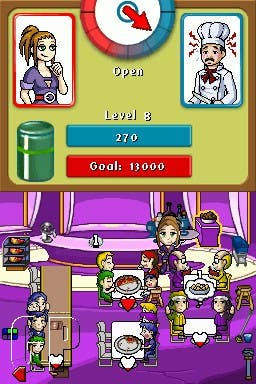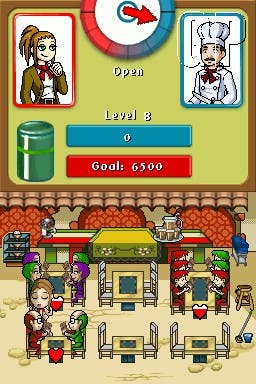Diner Dash
Fast food.
Undress any good videogame, be it Crackdown, Chuckie Egg, Civilisation or Counter-Strike, and often what you're left with is basically Tetris.
Videogames might have ten thousand different faces and costumes to distinguish themselves from one another, but scratch off the scenario and the good ones all employ the same principles, logic, framework and tricks. We're made to search for patterns, clear obstacles, manipulate objects to progress and stave off inevitable failure for as long as possible. We've been sold the same meagre fistful of tasks and routines over and over across videogaming's short decades and genres.
When Jack Thompson and the medium's other shrill-with-affected-outrage opponents call all videogames evil or claim they're just for stupid people they instantly look silly. Anyone who has played Chess or Tetris knows, games are simply re-presenting life's own puzzles and challenges albeit minus its cruel unpredictability and consequence.
Of course, what naysayers really object to is the oftentimes controversial clothing of these life-mimicking mechanics. A shoot-out in Grand Theft Auto might be based on the exact same principles and requirements as Space Invaders (dodge the bullets, watch out for degrading cover and hit them first) but the skins convey very different connotations.
Likewise, you too are probably guilty of dismissing Diner Dash long before you made it to this sentence - not for its gameplay, which is based upon the most concrete of Soviet foundations - but because of its ostensibly dull skin. Who wants to role-play working in a restaurant serving the unwashed masses for the minimum wage in their leisure time?

But you don't want to be Hillary Clinton now do you? So look past the scenario and hear this: Diner Dash is a brilliant little videogame, masterfully pitching its learning curve, building up the layers of complexity with humour and ease. Yes it's simple and throwaway and skinned in a job nobody aspires to, but ultimately it reveals a cute and loveable gameplay heart that's more compelling than rivals born from ten times its budget. Never be fooled into thinking that games have anything much to do with their setting.
The story is as insignificant as you'd want it to be. You play as Flo, a disillusioned office worker who has traded her paperwork for paper napkins (etc.) as she starts up her own restaurant. Control is all handled with the stylus and, to start with, gameplay can be broken down into five simple tasks: seat a customer, take their order, deliver their food, take their money, clean their table. New clientèle arrive at staggered intervals through your shift and instantly you're into the Tetris-style management of intelligently placing and satisfyingly clearing blocks (customers).
To begin with your restaurant is small and sparsely decorated with just a couple of tables but soon enough you'll be managing tables of different sizes and customers of different behaviour types: from families with small children who need high-chairs and mopping up afterwards to business-women who want fast food and quicker service.
The game's broken into stages each of which has a minimum score requirement to pass (as well as an expert threshold to aim for once completed). Every action you perform earns you points (and more points the happier your customers were with their experience) and completing any two like actions in succession, such as clearing two plates at once or noting down two orders before passing them to the kitchen, earns a combo bonus. Extra points can also be earned by matching customer's colours (everyone's clothed in different primary tones) to that of their chairs - a difficult task when you've only a few spare seats left during the lunchtime rush.

Each customer has a heart symbol which fills and empties to illustrate their happiness (or regret) and you must keep this filled by serving free coffee, colas and desserts in-between your other work. Should any customer be kept waiting for too long (either before being seated or while waiting for food) then they will likely walk out, drastically lowering the top score ceiling for that level. Flo can chat to customers waiting in the line or even seat them on a waiting bench to keep their happiness levels up during busy times when the restaurant's full.
Completing levels allows you to make simple choices on the restaurant's developing décor and completing each of the six restaurants gives Flo a new outfit. Once the Career Mode has been completed there's Endless Shift to see you through retirement and, importantly, the bright two-player competitive mode - which works exactly how you'd imagine it to. The game grasps the player tightly from the off and, while the gameplay settles into a familiar pace and routine quickly, still manages to be compelling many hours later.
Negatively the game is unavoidably repetitive, slight on bonuses (both extra modes and extra costumes) and basic in its Japanese-y sprite work. But none of this really matters when the core mechanic is so well executed - indeed the repetition is arguably a positive as, with all games of this ilk, the learning and perfection of technique is the drug.
Diner Dash is brilliant, not because it gives us a gritty insight into what it's like to slave as an overworked waitress in an understaffed restaurant. Rather, it's brilliant because it presents a slick and fast-paced management puzzle within firm boundaries and rules that manages to teach the player all of its lessons before he or she gets bored and moves on. For those players turned off by the anti-aspirational scenario: never be fooled into thinking that games have anything much to do with their setting.

